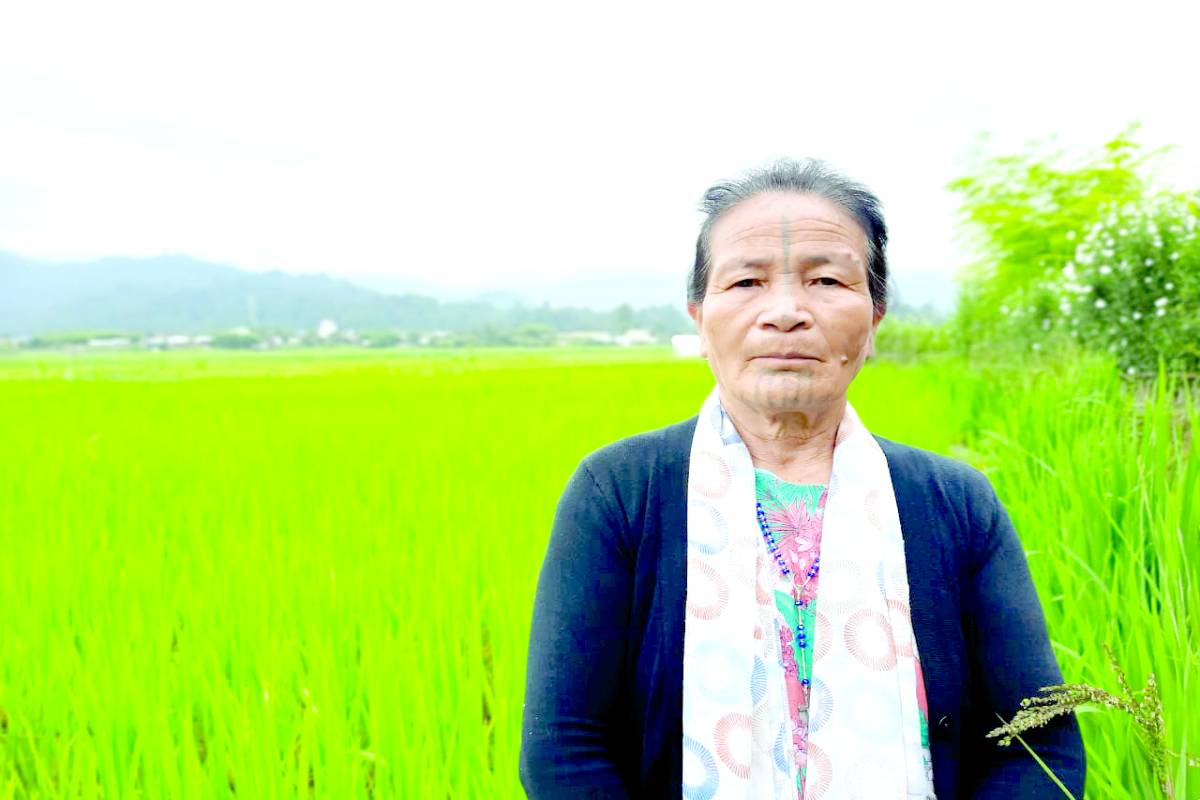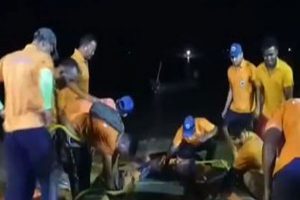The customary laws in Arunachal Pradesh do not allow women to inherit or be equal with the men of their own tribes. Although there have been talks on altering certain laws to allow daughters the right to immovable properties in the absence of a biological son, it remains a dialogue and has not been substantiated so far.
This deep-rooted prejudice towards women is so rampant in the culture that one can even see it in the folktales that have been orally passed down by elders. The story about Abotani, believed to be the progenitor of the Tani tribes, clearly illustrates this point. The Tani tribes consist of the Apatani, Nishyi, Galo, Adi and Tagin as well as the Mishing tribe settled in Assam. A monument to Abotani can also be seen on the highway near Itanagar, the capital of Arunachal Pradesh.
One will find, however, that there is hardly any mention of the important women of those times who contributed to the Tani tribes’ growth. Diilyang Diibu, the estranged wife of Abotani, was a hard-working rice cultivator whose toils resulted in abundant harvests for generations. Abotani soon married another woman though and left Diilyang Diibu heartbroken. Later, Abotani went on to marry several other women, which perhaps birthed the polygamy system prevalent even now among the Tani tribes.
Abotani’s sister Dolyang Chanjang is believed to be the first priestess. She was wise and could foresee dangers and hence protected Abotani multiple times from many pitfalls, even death. The contributions of Diilyang Diibu and Dolyang Chanjang have played a vital role in the growth of the tribes. And yet, Abotani has always been the focal point and the stories of these women remain only a subaltern voice.
Tailyang Santii’s life shares a similar narrative with Diilyang Diibu and Dolyang Chanjang. She is popularly known as Anne Shanti, meaning Mother Shanti, and her struggle, to uplift and empower destitute women, children, the disabled and less fortunate, is monumental. Despite being raised in a broken home and having studied only till Class VII, she has accomplished more than anyone with a degree or wealth in the entire Ziro plateau.
With tattoos still prominently etched on her face, a mark of Apatani women, Anne Shanti is founder and head of the distinguished non-governmental organisation Achukuru, meaning helpless. The Achukuru Welfare Society has two branches, the Mother’s Home and the Children’s Home. The Mother’s Home is an open house for destitute women and anyone seeking aid, while the Children’s Home aims to help minors, who are victims of rape, abuse, child labour, are orphaned or disabled. Although Anne Shanti is regarded as a prominent humanitarian in the community today, her journey has not been easy.
Born in 1965 in Reru village of Ziro, Anne Shanti grew up with a widowed mother with little financial support, which prevented her from pursuing further education. Being widowed in the Apatani community often made women vulnerable in those days as they were mistreated and more likely to live in abject poverty. Besides witnessing her mother’s plight as a widow, Anne Shanti became a victim of domestic violence after her marriage. In addition to the physical and emotional abuse, her husband abandoned her for another woman.
Anne Shanti and her four children were left to fend for themselves. To put food on the table, she undertook several jobs — from selling homemade rice wine and toiling in rice fields for meagre salaries to working in a school as a temporary teacher for two years. Subsequently, she was offered work as a policewoman but declined it, since leaving her children for a nine-month training programme was not an option.
Her experiences as a woman and the lives of widows around her, who became destitute, propelled Anne Shanti to establish her first NGO Hiimi Miji Welfare Society in 1993. It was mainly focused on supporting and providing aid to widows.
In 2001, Anne Shanti established Achukuru Welfare Society. To keep the organisation afloat, she had to put on multiple hats — from being a cook, barber, labourer and sweeper to a counsellor, secretary and president, but most of all, being a mother to occupants. The organisation also provided legal services, vocational training, free education and counselling to help people reintegrate into society and live a life of independence and dignity. Anne Shanti relied on others to draft request letters for the NGO, just for the organisation to come into existence. Criticism on how the organisation should be run was a constant occurrence since the start but she endured it all. When asked what kept her going despite all the challenges, she said, “When you do something from your heart you are never tired. What I do comes from the bottom of my heart.”
After years of labour, support from the government and general public gradually increased as donations began to pour in. In 2011, the United Nations Development Programme helped build a museum and private pond for recreational activities to generate income for the NGO. In 2012, after several petitions, the Government of Arunachal Pradesh donated a shelter for the Mother’s Home in Lekhi village, about 20 kilometres from Itanagar.
In 2011, Anne Shanti was bestowed the Anita Sen Memorial Award for her selflessness, determination and courage to fight the odds and build an abode for women from the most vulnerable sections of society in Arunachal Pradesh. In 2013, she received a commendation certificate from the Government of Arunachal Pradesh in recognition of her services to the state.
Anne Shanti has received many other certificates for her work and has inspired several people. Atsuko Aiwahata, a Japanese anthropologist, is one of them. A few years ago, she travelled to Ziro and came across the NGO where she met Anne Shanti. She was deeply inspired and decided to open a Mother’s Home in Japan. Atsuko still visits Achukuru. Anne Shanti’s contribution to Arunachali society has been seminal and yet, it is only in recent years that she has gained recognition. One wonders if that is so because she is a woman.
Advertisement
Advertisement











